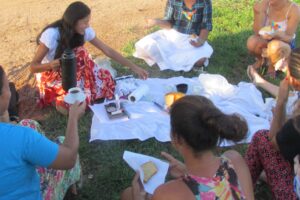Jesus to the Ciganos - Maria Mariane

My Calling - Taking Jesus to the Ciganos
I am taking Jesus to the Ciganos. My inspiration is biblical texts such as Isaiah’s call and the vision of Paul for the Macedonians “Come over to Macedonia and help us.” (Acts 16:9, ESV). Most significantly is Jesus’ sending the disciples to all nations: “Go therefore and make disciples of all nations, baptizing them in the name of the Father and of the Son and of the Holy Spirit, teaching them to observe all that I have commanded you.” (Mt 28:19-20a, ESV). These verses made a strong impression on me and made me understand my Christian responsibility. They kindled in my heart the desire to proclaim Christ where he has not yet been announced.
Why are Ciganos a Priority?
Prejudice

Becoming Christlike
Life for Ciganos
The religious view of the Ciganos depends on the recent influences in their community. Many have a religious view similar to Catholicism, mixed with elements of Protestantism and African animism.
When it comes to money, Cigano Gypsies do a variety of things. Some Cigano women perform palm readings in order to feed their families. Some younger people try to get work, but because of the reputation of the Cigano work ethic, many companies are reluctant to hire them. This leaves many Cigano families reliant on assistance from the federal Brazilian government, which has a program called Bolsa Familia. Bolsa Familia can pay Cigano families up to $R500 per month, depending on the size of the family. However, $R500 is less than $100 US, which can lead to the family’s abject poverty if they have no other sources of income. The need of the Ciganos for the hope and help of Jesus Christ is desperate.
Maria - My History
My name is Maria Mariane (not real name), I’m 34 years old. I am a member of Evangelical Action (ACEV) in the tiny town of Vazante Diamante, Paraiba, shepherded by Pastor Manoel Abílio Sobrinho.
I was born in the city of Ibiara, Paraíba (Northeast Brazil) and lived most of my youth in a remote rural zone near Diamante, Paraiba. My parents converted a few weeks before me. Today my father is a pastor for a Vazante village in addition to a Quilombola village in Barra de Oitis near Diamante. There are 2 small churches there.
I was converted when I was 10. It was not long before I understood that God chooses and assigns us to preach His Word – the good news of Jesus.
Early Missionaries in My Life
It was amazing for me to see that people who knew Christ were willing to leave everything in this world to serve Him. A couple left their home in São Paulo – a prosperous part of Brazil – to live among the Sertanejos – poor rural “backcountry” people. They came so far to share the gospel, to me! Merely so that I could know Christ and enjoy a personal relationship with God too!
In time the couple from São Paulo left. A little time later God sent a new missionary who came to live in my house and taught me a lot about missions. Years later God sent a group from JUVEP to rebuild my church. This was “Radical Sertão.” All of these missionaries set an example I followed.
Specific Ministerial Direction to Maria
I have always had my heart willing to serve where the Lord sent me. I first met the Ciganos in 2010. For two months, I worked with the children of the area. Four years later I returned to this region, and I saw this need not only for children but also for adults. I finally understood that this is where I should serve – taking Jesus to the Ciganos.
Mission Preparation
Since 2009, sent by my church, I have been a missionary in partnership with the JUVEP mission. I have been supporting various church planting work in a variety of communities in the rural Sertão. However, for the last 5+ years I have focused on the Cigano ranches (Gypsies)
Before going on the year-long Radical Sertão mission, we went through a 6 month training. After finishing the one and a half year project, I felt the need to prepare further. God opened the door to take the Missionary Preparation Course at JUVEP’s Center for the Preparation of Missionaries (CPM). This was a full-time education for a year. This education included a one-month mission trip in Guinea Bissau, a tiny country on the west coast of Africa. Guinea Bissau is a fellow Portuguese-speaking country, and has the misfortune of being one of the poorest countries in the world.
Importance of JUVEP
The JUVEP training at CPM has been very important to my work today. It has prepared me for daily challenges: seeking to know the people and understand their culture. Because of JUVEP’s training this generates less wear and tear on my body and soul. It helps me follow Jesus’ commandment to spread the Gospel throughout the world.
Today I serve small communities (ranchos) of Ciganos – in English they are called Gypsies. The Gypsies are a very oppressed people and in great need in every way. Spiritually they do not have Jesus, as they are a syncretistic people (as are many in the Sertao). Physically they are needy because they are affected by disease, poor sanitation and hunger. Culturally they are needy, because few have hope for a better future. My efforts in the Sertao are to improve the conditions of the Cigano people, spiritually, physically, and culturally.
My Passion - Taking Jesus to the Ciganos
“But we have this treasure in jars of clay to show that the surpassing power belongs to God and not to us.”
(II Cor. 4.7 ESV).
I love to teach and see the fruits of teaching grow. When I do Bible studies I see people opening their eyes and seeing the truth, breaking free, giving away their sins and placing their faith in Christ. I feel rewarded. It is an inexplicable joy and a treasure – one that cannot be bought with money. When I look 5 years back I see that the children are no longer the same. They know many truths of God’s Word and often correct each other with the Word. I believe they will not grow up making their parents’ past mistakes and will have a hope for a new life with Jesus.
Special Needs for Taking Jesus to the Ciganos
- An income generation project that fits the profile of the Cigano culture.
- Opportunity for leisure in the community: such as a sports court and/or a public square
- Improvements in health and education, also in relation to local hygiene.
- I would be blessed with a missionary couple who love and understand Gypsies, so we can work together. As a single woman, it is difficult to effectively reach the men.
- Completion of church project, living rooms, bathrooms, kitchen, giving us a better place (than outside) for worship services.
Weekly Bible Study - Taking Jesus to the Ciganos
We have a weekly Bible school with 40 to 50 children, divided into 3 classrooms. We use the municipal school building for the Bible school. The Sunday night service we do in the church, at the same time we stay with the children (10) outside the church for lack of room. There is joy in taking Jesus to the Ciganos.
The Ciganos are a very challenging group to preach the gospel. Their culture makes it so difficult to “break free” and embrace the freedom in Jesus. Sanitation is a big problem here, largely due to culture. Programs that can effectively teach the benefits of basic cleanliness and begin to give these people hope for a better life are needed.
Pray for the Lord to provide the wisdom so I can reach these people well. Bring to them the hope of Jesus – the ability to look to their savior. They need to break out of a survival (get by) mentality in their normal daily lives and get the eternal perspective – fixing their eyes on Jesus.
Having a car at my disposal would also be very helpful. Sometimes I would like to go out for a leisure time with them, and I can’t because I don’t have transportation. I depend on third parties. But, most of the time they are busy with their tasks or their personal leisure.